#arab american fiction
Explore tagged Tumblr posts
Text

“A gorgeously written and profoundly intimate debut.” —Etaf Rum, author of New York Times bestseller A Woman Is No Man
Read BETWEEN TWO MOONS by Aisha Abdel Gawad
#between two moons#aisha abdel gawad#etaf rum#a woman is no man#fiction#arab american#arab american fiction
10 notes
·
View notes
Text

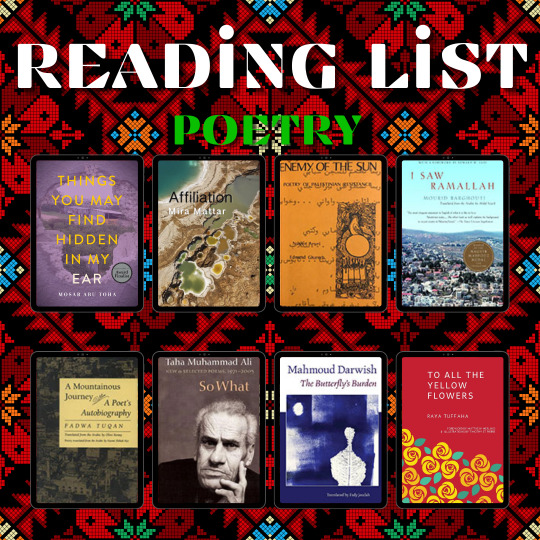
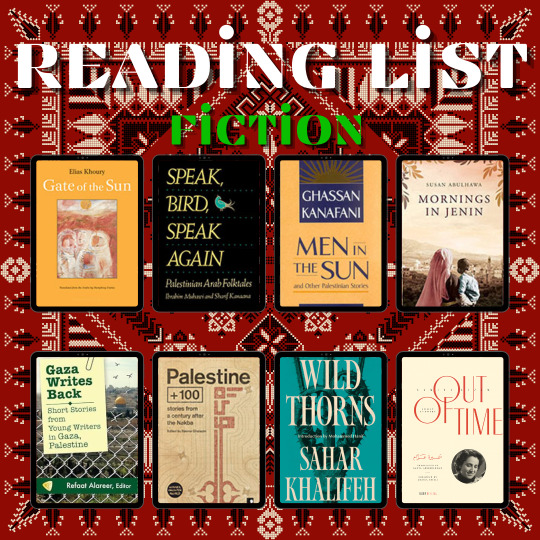
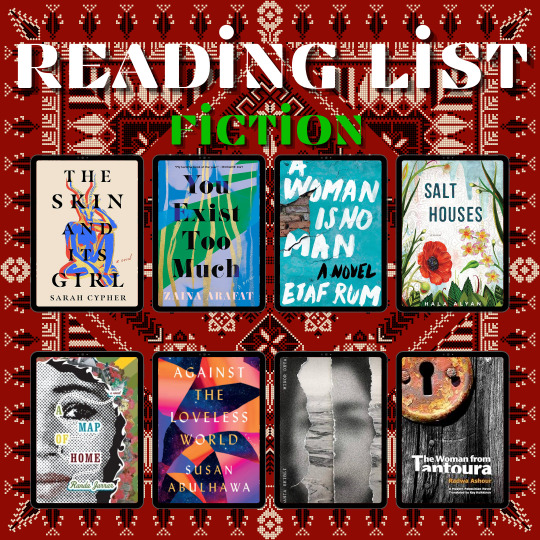
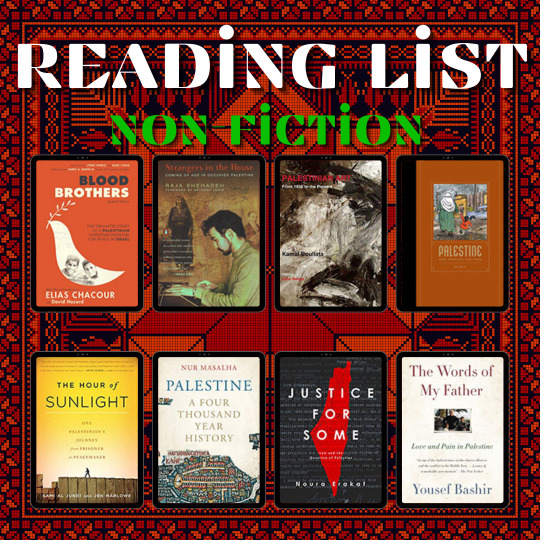

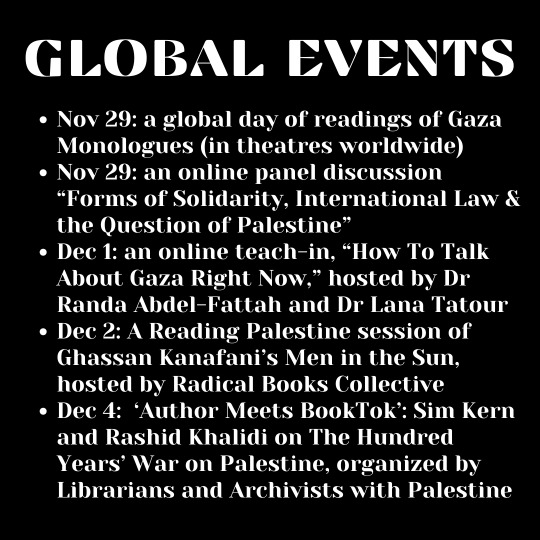
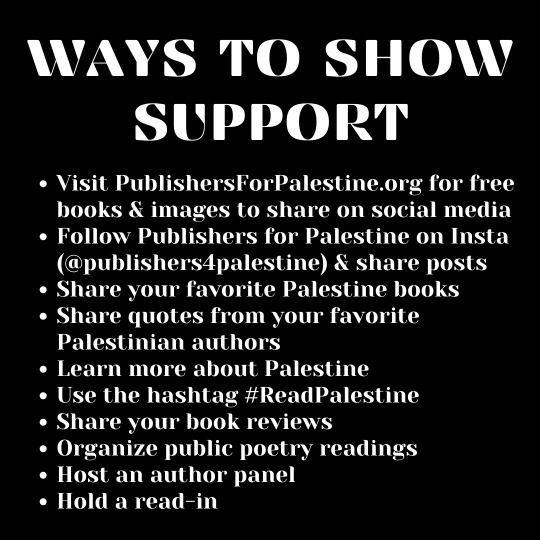
Read Palestine Week
🇵🇸 Good morning, my beautiful bookish bats. Can I start by saying a huge THANK YOU for sharing my Queer Palestinian Book post? Seriously, thank you so much. Let's keep that momentum by observing Read Palestine Week (Nov 29 - Dec 5). I've compiled a list of books to help you, along with a list of upcoming events and resources you can use this week and beyond.
🇵🇸 A collective of over 350 global publishers and individuals issued a public statement expressing solidarity with the Palestinian people. Publishers for Palestine have organized an international #ReadPalestine week, starting today (International Day of Solidarity with the Palestinian People).
🇵🇸 These publishers have made many resources and e-books available for free (with more to come). A few include award-winning fiction and poetry by Palestinian and Palestinian diaspora authors. You'll also find non-fiction books about Palestinian history, politics, arts, culture, and “books about organizing, resistance, and solidarity for a Free Palestine.” You can visit publishersforpalestine.org to download some of the books they have available.
POETRY 🌙 Things You May Find Hidden in My Ear by Mosab Abu Toha 🌙 Affiliation by Mira Mattar 🌙 Enemy of the Sun by Samih al-Qasim 🌙 I Saw Ramallah by Mourid Barghouti 🌙 A Mountainous Journey by Fadwa Tuqan 🌙 So What by Taha Muhammad Ali 🌙 The Butterfly’s Burden by Mahmoud Darwish 🌙 To All the Yellow Flowers by Raya Tuffaha
FICTION 🌙 Gate of the Sun by Elias Khoury 🌙 Speak, Bird, Speak Again: Palestinian Arab Folktales 🌙 Men in the Sun by Ghassan Kanafani 🌙 Morning in Jenin by Susan Abulhawa 🌙 Gaze Writes Back by Young Writers in Gaze 🌙 Palestine +100:Stories from a Century after the Nakba 🌙 Wild Thorns by Sahar Khalifeh 🌙 Out of Time by Samira Azzam
🌙 The Skin and Its Girl by Sarah Cypher 🌙 You Exist Too Much by Zaina Arafat 🌙 A Woman is No Man by Etaf Rum 🌙 Salt Houses by Hala Alyan 🌙 A Map of Home by Randa Jarrar 🌙 Against the Loveless World by Susan Abulhawa 🌙 Minor Detail by Adania Shibli 🌙 The Woman From Tantoura by Radwa Ashour
NON-FICTION 🌙 Blood Brothers by Elias Chacour 🌙 Strangers in the House: Coming of Age in Occupied Palestine by Raja Shehadeh 🌙 Palestinian Art, 1850–2005 by Kamal Boullata 🌙 Palestine by Joe Sacco 🌙 The Hour of Sunlight: One Palestinian’s Journey from Prisoner to Peacemaker by Sami Al Jundi & Jen Marlowe 🌙 Palestine: A Four Thousand Year History by Nur Masalha 🌙 Justice for Some: Law and the Question of Palestine by Noura Erakat 🌙 The Words of My Father: Love and Pain in Palestine by Yousef Khalil Bashir
🌙 Traditional Palestinian Costume: Origins and Evolution by Hanan Karaman Munayyer 🌙 Mountain against the Sea: Essays on Palestinian Society and Culture by Salim Tamari 🌙 This Is Not a Border: Reportage and Reflection from the Palestine Festival of Literature 🌙 We Could Have Been Friends, My Father and I: A Palestinian Memoir, by Raja Shehadeh 🌙 Les échos de la mémoire. Une enfance palestinienne à Jérusalem, by Issa J. Boullata 🌙 A Party For Thaera: Palestinian Women Write Life In Prison 🌙 Light in Gaza: Writings Born of Fire, 🌙 Voices of the Nakba: A Living History of Palestine
#free palestine#save palestine#books#book list#book recs#book recommendation#booklr#book blog#batty about books#battyaboutbooks#arab american heritage month#arab american writers#palestinian writers#palestinian poetry#poetry#poetry books#nonfiction#fiction books#queer fiction#queer community#queer books#muslim writers#read palestine week
264 notes
·
View notes
Text
i'm curious about something. bcs in my head if a waiter introduces themselves by name in a fic i automatically assume the writer is us american so
please reblog to get a bigger sample pool & put in the tags what your answer is and where you're from if you want :]
#tumblr polls#polls#us american#restaurant#fanfiction#fan fiction#fanfic#european#asian#african#arab#culture#australien
24 notes
·
View notes
Text
So we can't play characters in Aladdin, a centuries-old Arab folktale, because in the 90's an American company made an Orientalist animated-adaptation where they used some Indian elements, so therefore its okay to erase us from our folktales and contribute them to a completely separate/unrelated culture.
We can't play characters in Dune, a story from a sc-fi novel that's explicitly inspired by Arabic/Islamic culture and the European colonialism of the Middle East, because it takes place in a planet called Arrakis (literally based on Iraq) so therefore it just a "FIcTioNal pLanet! It hAs NoTHinG tO Do wiTH REaL wOrLD CuLtUreS!!."
We can't play characters from Kahndaq, a country that's literally located in the real-life Sinai Peninsula (which is a part of Egypt), but because it's own independent country that got detached from Egypt, people will gaslight us into thinking it has nothing to do with Egypt or any Arab county, so therefore its okay not to hire any Egyptian or Arab actors.
And now we can't even play characters from a fictional kingdom called "ARABster," probably the most stereotypical Arabic nation in fiction ever with how down-right stereotypically Arabic it is (it's in the name for God's sake), because the studio's CEO is a racist Zionist and because 20+ years later in a random book that wasn't even written by the author there's a line that claims they might have been slightly inspired by an Indian city on top of his extremely heavy inspiration of Egypt.
Like Goddamn, who tf are we supposed to play then? Beside racist caricatures that dehumanize and demonize us so that people who grow up watching them will not feel sorry for us when the US's army kills us, I'm sure Hollywood will make sure to hire us for those roles.
156 notes
·
View notes
Note
Is it true that during the founding of Israel, to persuade Arab Jewish peoples to emigrate from their countries to Israeli settlements, European zionists would stage false flag attacks on Arab Jewish communities and bomb synagogues and community centers to stoke tensions and fear? Are there any resources like books where I can read about this?
I'm so sorry, I just saw this now and it's past 3AM over here so I'm running on fumes 😣 sorry if this is confusing or doesn't make sense
Look up the 1950–1951 Baghdad bombings, where Iraqi Zionists and the Mossad staged terrorist attacks against Jews in Iraq to literally scare them into moving to Israel. And also the Levon affair and Operation Susannah; more terrorists attacks this time for geopolitical reasons (the US' growing support of Egypt at the time).
Off the top of my head I can't remember the exact titles of the books I read (I read them in another language and I really don't want to mess up and give you titles that don't exist in English), but pretty much anything written by Ilan Pappé is a must. He's an Israeli historian and political scientist, and also an anti-Zionist activist who left Israel.
A title I do remember (because it's on my nightstand right now lol) is "Jewish Terrorism in Israel (Columbia Studies in Terrorism and Irregular Warfare)" which describes various acts of Israeli terrorists, from their attacks against British soldiers and the Arabs, to the assassination of the last Israeli Prime Minister that tried to sign a 2-State solution with Palestine (Yitzhak Rabin, who was about to sign the Oslo Accords; the Israeli right wing created such a climate of fear and violence around him and the Accords, that a Jewish extremist killed him in the streets of Tel Aviv, during a peaceful demonstration in support of the Accords; to this day, some members of the Knesset openly accuse Netanyahu of being behind the assassination).
If you want quicker access to information, I've recently found 2 Jewish activists that I suggest you check out: one is Sim Kern, author and journalist (Sim_bookstagrams_badly on Instagram, simkern on TikTok), they have some great books suggestions, both for fiction and historical/educational purposes. Their latest suggestion is:
"The Hundred Years' War on Palestine: A History of Settler Colonialism and Resistance, 1917-2017"
By Rashid Khalidi
They also have some GREAT videos explaining how the perception of Jews changes in the eye of the global Western superpowers depending on the situation (how they treat Jewish people in their own countries as people of color, while at the same time seeing the Israelis as white because they are an extension of their power, basically); how Israelis cannot be considered indigenous of Palestine (the first European Jews openly called themselves colonizers, they brought violence, death and destruction to the people and the environment of Palestine, and have dispossessed indigenous people who have continuously lived in Palestine for millennia; ). Basically how Israelis continuously enact white supremacy, racism, ethic cleansing on the Palestinians (and now genocide). Israel is founded on acts of terrorism.
The other activist is Katherine W. Bogen (k.w.bogen on Instagram and sexyalityscholar on TikTok). She makes easy to comprehend, straight-to-the-point videos about the history of Zionism, Israel being an apartheid state, how Israel does not represent Judaism, etc.
Norman Finkelstein is also a famous anti-Zionist activist, who wrote "The Holocaust Industry: Reflections on the Exploitation of Jewish Suffering". You might have seen a famous video where he absolutely demolishes an Israeli sympathizer for using the Holocaust to justify the oppression of Palestinians, and how their "crocodile tears" don't move him.
Another book I suggest is "Theft of a Nation", by William W. Baker.
Edward Said was a Christian Palestinian-American activist and academic, check out his work. I've recently seen an old video of him: he was invited on a television interview to debate the at-the-time Israeli ambassador Netanyahu. Netanyahu not only refused to be in the same room as him, but wanted to be in a different building altogether. When the moderator asked why, Netanyahu answered "Because he wants to kill me!" and started talking about how all Palestinians want to kill the Israelis 🙄 (obviously, the moderator didn't care for it lol)
If you feel like going for a deep dive, you might want to check out the website and Publications archives of B'TSELEM. They are an Israeli, non-governmental, non-profit organization whose goal is to document the human rights violations committed by Israel in the West Bank.
Try to find videos of ex Israeli soldiers that have left the army and Israel because they couldn't stand their policy of violence any more. What the Israeli army and police do in the West Bank and at the time in Gaza on a DAILY basis can't be described in any other way. Kidnappings, beatings, dispossession, "administrative detention" aka imprisonment without charge or trial, which can be extended every 6 months, indefinitely. There are Palestinians who have been imprisoned without cause for years, even children as young as 11, kept in solitary confinement. Over 800,000 Palestinians have been imprisoned without charge or trial since 1967 (after the war that Israel started by bombing Egypt).
IF one is "lucky" enough to get a trial, it's in front of a military court. A judge even admitted that he gets ALL the information on the case from the military and doesn't doubt what they say. Independent organizations have estimated that 10,000 Palestinians are currently imprisoned in Israel.
(I always suggest to check out Israelis who speak out against Israel not because I want to center their perspective, but because Zionists will dismiss any opinion that comes from other sources)
Lastly, know that Menachem Begin, founder of the Likud party (that currently governs Israel) and 6th Prime Minister of Israel, was internationally recognized as a terrorist. He was the leader of the terrorist organization Irgun, that committed such atrocities against Palestinians that Einstein (yes, that Einstein) and Hannah Arendt compared it to the Nazis.
That's the foundation of Israel. Israel is a terrorist state.
Edit:
.
And check out a book called "Zionism in the age of dictators" written by journalist Lenni Brenner. It talks about how Zionists collaborated with fascists and Nazis to establish Israel.
Also google the Lehi militant group, a Jewish terrorist organization.
From Wikipedia:
"[...] often known pejoratively as the Stern Gang, [Lehi] was a Zionist paramilitary militant organization founded by Avraham ("Yair") Stern in Mandatory Palestine. Its avowed aim was to evict the British authorities from Palestine by use of violence, allowing unrestricted immigration of Jews and the formation of a Jewish state. It was initially called the National Military Organization in Israel, upon being founded in August 1940, but was renamed Lehi one month later. The group referred to its members as terrorists and admitted to having carried out terrorist attacks.
Lehi split from the Irgun militant group in 1940 in order to continue fighting the British during World War II. It initially sought an alliance with Fascist Italy and Nazi Germany. Believing that Nazi Germany was a lesser enemy of the Jews than Britain, Lehi twice attempted to form an alliance with the Nazis, proposing a Jewish state based on "nationalist and totalitarian principles, and linked to the German Reich by an alliance"
Lehi assassinated Lord Moyne, British Minister Resident in the Middle East, and made many other attacks on the British in Palestine."
Israel is a terrorist state.
454 notes
·
View notes
Text
Lego Ninjago and Race: An Analysis for the Upcoming Live Action
I know there’s been a lot of discourse in the ninjago community since a live action movie has been announced, and there’s sure to be even more after the cast list is released. Many fans are afraid the cast will be all white, while others don’t care what race the ninja will be. Non-fans looking in from the outside might say, “Why does it matter? They’re legos, they’re yellow.” I’ve seen this argument more recently, especially revolving Arin in the soft reboot Dragons Rising.
The point of this longer post is to explain how race still exists in Ninjago despite the plastic, yellow nature of the characters, and why making the cast entirely or mostly white would be a disservice to the fans and the source material as a whole. So let’s ninja-go into this topic.
Part 1: Hair and Black-Coding
When people claim that legos don’t have race, they often claim it’s because they are yellow. However, they forget that legos still have humanoid characteristics, and one of the easiest ways to tell when a lego character is black-coded is to look at their hairpiece.
Here are some examples of hairpieces clearly meant to resemble black hair textures/hairstyles:
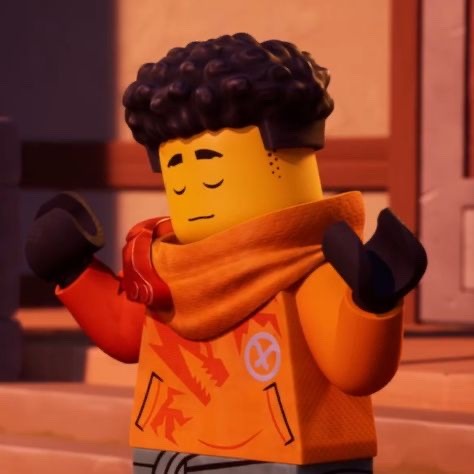
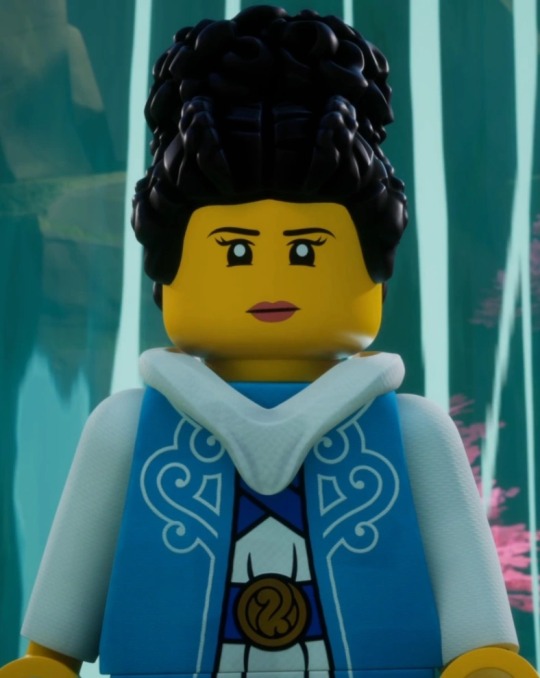
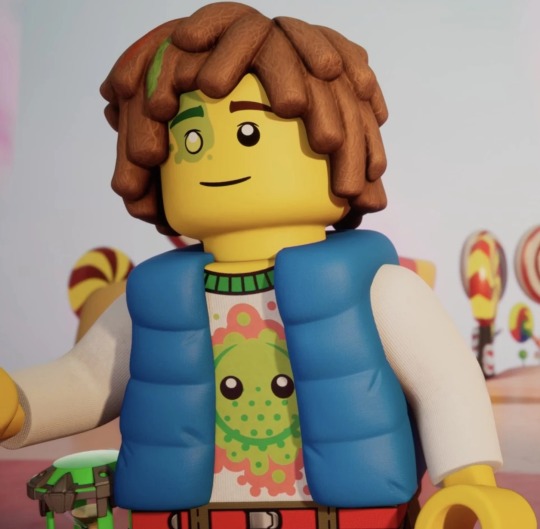
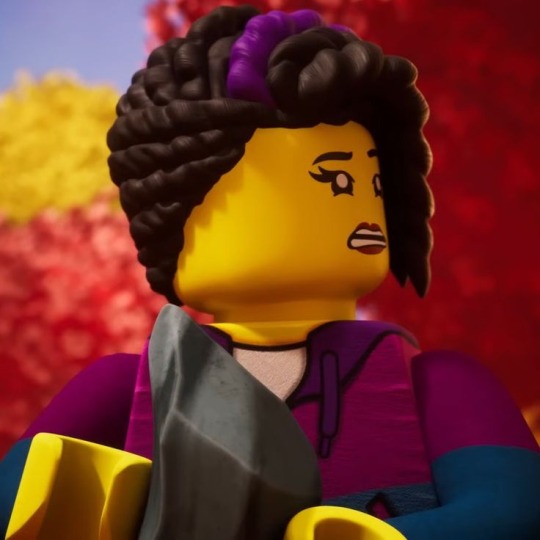
When characters have textured hair (i.e. Arin and Euphrasia from Ninjago) or locs/braids (i.e. Mateo and Zoey from Dreamzzz), it’s hard to argue they’re meant to be interpreted as anything other than black. And if that’s not obvious enough, there’s also:
Part 1b: Voice Actors and Black-Coding
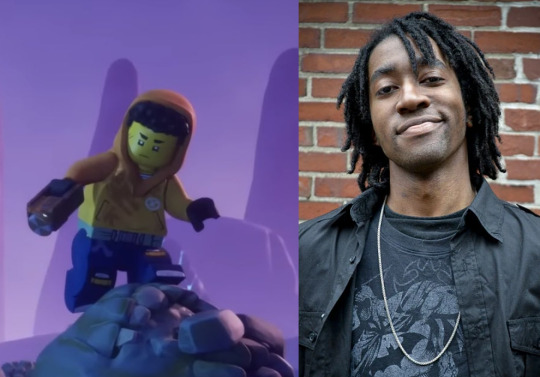

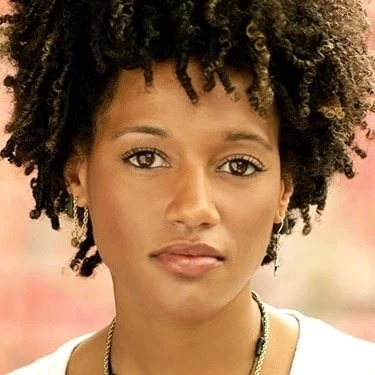
People of color voice acting non-human characters doesn’t determine race, but it does add to character coding. This can be seen in characters from other shows, such as Darwin from The Amazing World of Gumball. Even though Darwin is a 2D animated goldfish, he has been voiced exclusively by black voice actors. Because of his voice (and other mannerisms/narrative elements), Darwin is generally accepted to be black-coded.
Being voiced by a person of color does not automatically make a character black-coded, but it can certainly add credence to characters who already have black characteristics, such as Arin and Euphrasia.
Part 2: Names
Another reason it’s hard for ninjago fans to interpret certain characters as white is because of their names. While many have stereotypical “American white boy names” (i.e. Jay, Cole, and Zane), other characters have names that are certainly not strictly American. Examples include Wu (a Chinese surname), Misako (a Japanese name), Chen (a Chinese surname), Okino (a Japanese surname) and Sora (Japanese given name). Ninjago may be set in a fictional world of animated, plastic people, but it’s still based on real-world names, and considering how a lot of the characters’ names come from East Asia, there is merit to declare that characters like Misako and Sora are meant to be interpreted as East Asian.
Part 3: Cultural Influences
Now, to the most obvious reason why it would be absurd to put an all-white cast on screen: the cultural influences. I am not Asian myself, but other ninjago fans have expressed frustration about the cultural melting pot that is Ninjago. It takes influence from both Eastern and Western cultures for its setting, worldbuilding, lore, and fantastical elements. Ninjago puts ninja, samurai, Kabuki, and Oni from Japanese history and culture, Djinn from Arabic regions, the yin/yang concept from Chinese philosophy, and dragons from various cultures into one narrative. There’s even a character named Ronin (which means a “wandering samurai”).
Additionally, the ninjago language seems to be inspired by Tategaki, an East Asian style of writing.
What this means is that Ninjago is brimming with real-life cultural influences. They rarely come from the same places and are not always faithful or accurate. In fact, they can sometimes seem borderline disrespectful and stereotypical in the earlier seasons- particularly with the portrayal of Chen and pilot Wu. However, it doesn’t take a genius to spot the East Asian cultural influences on ninjago. This is clear in the character designs, attire, and especially in the settings:
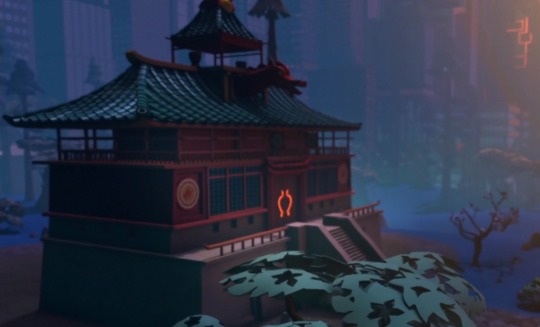
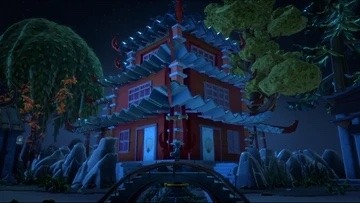
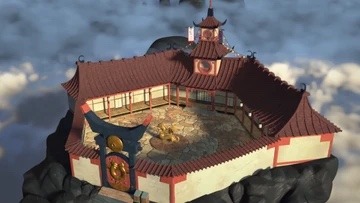
Part 4: What does this mean?
In summary, Ninjago is a fictional setting that takes inspiration from East Asian cultures, and has coded certain characters as certain races through more indirect means such as naming and designs. Even though none of the ninjago characters have 100% canon races, there is still evidence that some are meant to be interpreted as black or Asian. Therefore, making all the ninjago characters white would be a disservice to the fans AND the source material because it takes away subtle but essential parts of the characters and world.
Additionally: Representation matters. It could mean a lot for fans new and old to see the ninja becoming humanized and seeing themselves on screen. Not only would an all-white cast be unfaithful to the source material, but it would be disheartening to fans hoping for racial representation, especially in an age where “wokeness” is considered a touchy subject in some areas.
Part 5: Other Thoughts/Clarifications
The beautiful thing about Ninjago is that the Lego nature of the characters allows them to be interpreted in so many ways. The characters don’t have canon skin tones, eye color, body types, ages, heights, etc., so they can be whatever fans want. Whatever the fans interpret them to be or even what they feel like, they can be. And I think that’s beautiful.
TLDR: I don’t want the movie casting to limit the fan’s creativity or headcanons. Even if the cast isn’t entirely white, I hope people continue to make creations with their own interpretations of the characters.
Also: I urge fans to not harass the actors if they are white. I feel like the ninjago fandom is above that but I feel inclined to make this statement in advance regardless.
Finally: I’m leaving this post wide-open to discussion and discourse. I did surface-level research for the ninjago cultural influences, so if anyone wants to add on to or correct anything, feel free to do so. All I ask is that the conversations remain civil.
That is all :)
#ninjago#long post#ninjago live action#cole brookstone#jay walker#zane julien#lloyd garmadon#nya jiang smith#kai jiang smith#master Wu#Misako#essay#kinda#discourse#idk what else to tag#yapping a little#analysis#ninjago analysis#dragons rising#arin ninjago#sora ninjago#Lego ninjago#ninjago euphrasia#Lego dreamzzz#misako ninjago
75 notes
·
View notes
Note
Hey there. I'm writing a story set in New York City and am not American. I have few characters, but most of them are arab or white. I can't help but feel a bit wrong about it, given that America is much more diverse than that, and NYC being an emblem of that. Do you think I should force myself to include more representation or should I just tell my story, and leave that more diverse cast to some other story I could write? I know this is a neverending debate and there are many opinions about it, but I've always agreed with everything you've said in matters of representation in fiction, and so I'd be curious to know your personal answer on it.
I'm a little confused by how you're using "representation," here. It sounds like you think representation = "randomly sticking BIPOC everywhere." I think when most people use that word, it means something more like "create an accurate or at least plausible depiction of a group or place." In actual New York, there are plenty of Middle Easterners and white people who live in relatively homogeneous small communities where they might only see someone of a different ethnicity on the subway. If your story is set in one of those communities -- and you do stick some random BIPOC in that subway scene, because that's plausible -- then it sounds like your characters might be an example of good representation.
(Note: if you're not writing something set in the real world, but it features human beings, it needs to represent humanity as a whole, unless there's a good in-world reason not to. But if it's our world? You can get specific.)
Here's the catch, tho: plausibility is relative. If you've absorbed some biases and haven't done enough research, then you might end up writing something that feels plausible to you, but which isn't actually representative or plausible to anyone else. The way to avoid this is to do the research and check (to the best of your ability) your biases. For example, you aren't American, I assume you've at least visited NYC? If not, you should. You can visit some of the communities I mentioned! You can eat in restaurants, visit mosques, have conversations with actual real people who are living the life you're writing about! If you don't have the time, money, or spoons to do that, there are other ways to do good research -- films and YT/Tiktok videos made by people from the communities in question, for example. But you'd need to watch a lot of them to get a good representative sample.
I recommend this book to all the writing students I've taught at Clarion, and other writer workshops: Writing the Other, by Nisi Shawl and Cynthia Ward. There's a particular part of it that seems relevant here, which is a kind of hierarchy of "appropriate" appropriation, I think first mentioned by Diantha Day Sprouse but included in Writing the Other. Basically it says that if you want to write about a culture that isn't your own, you can learn about that culture in one of several ways: a) You can be an Invader, and just go take whatever intellectual and artistic tidbits from that culture that you want, regardless of how damaging this might be to members of that group. Example: non-Indigenous people who write about actual secret practices, or who encourage the desecration of sacred places. b) You can be a Tourist, in which you're still mooching from that culture, but at least you're figuratively paying someone for it and accepting tidbits that the culture has chosen to sell. Example: getting a sensitivity reader. Or c) you can be an Invited Guest, who brings in as much as they take out, and who has formed relationships that are beneficial to all involved. Example: being part of an exchange program, both as a student and later as a host, and maintaining those friendships outside of the program.
The goal is to be an IG, but that isn't always possible. Tourist is still better than being an Invader. (...I feel like I'm leaving out a category. It's been a while since I read the book; any more recent readers want to check me here?) But the closer you can get to actually participating in that culture, the more your work will be informed by reality instead of biases or misinformation, and the more likely your work will read as plausible not just to you, but to your widest possible audience -- people familiar with the culture and people who aren't.
(I'm a little concerned about your phrasing of "force myself to include more representation," note. Why would that need to be a forced thing? A writer's goal should be to write something that feels lived-in and authentic to [if it's a real place] most people's experience -- not to meet some arbitrary standard, but because that's how you master immersion and characterization. If good immersion and characterization feel forced to you right now, that suggests you need more practice. I recommend writing short stories!)
#answered asks#long#sorry I took a while to reply#some asks require more nuanced replies#and I put this one in drafts because it was so long#then forgot it was there#and yeah I'm aware this might be a disingenuous ask#but I am choosing to treat it as good faith
159 notes
·
View notes
Note
Me, a guy from Middle-East watching this Netflix shit compare me and millions of others to demons: What have we done to Adi Shankar to deserve this?
I've also seen victims of US invasions...it was really a horrible thing to use such a huge thing still fresh in the memory of the people as some kind of joke for his shitshow of an anime. The victims of war are still alive, what happened to them is fresher than the age of DMC franchise itself.
And of course the Christianity mockery is cherry on top. Assyrians are a large indigenous population in Middle-East with majority living in Iraq. And they are Christians. They have always faced discrimination but the US invasion was particularly cruel to them. Many of these native Assyrians were displaced, internally and externally.
Im just left speechless by how insensitive and abominable Adi Shankar is
It's just so. Tone-deaf in its attempt to be progressive.
"No no you see, Americans demonized Arabs for years, but they're not really as monstruous as they depicted them! Just like the demons in the show, who are not all evil but unjustly persecuted! I am so smart!"
You buffoon, you are still equating a real minority with a fictional non-human race. Someone who is genetically different to the core (in the show, Lady uses special bullets that react to demon DNA in particular, so yes, they really are not the same species despite diverging from the same source).
And not just that! Because it's in episode 4 that we first introduce this theme of "not all demons are bad". Before that? All the demons we see are evil monsters who delight in killing humans for shit and giggles! They seem to be the majority, in fact! So do we really want to take that comparison to its logical conclusion?
In real life, Muslim people became the unjust target of propaganda due to isolated terrorist attacks like 9/11: billions of people were made into "threats" for the actions of few. In the setting of the show, demons are generally aggressive for no reason. We even see Arkham at one point turning himself into a demon and eating his own wife, just like that. Do you fucking understand what you are saying, you hack.
And! And what does that make Dante, eh? He made a whole career of killing demons, and having fun at it too. Are we really painting Dante as a slaughterer of minorities? Oh my god this is literally like that stupid vampire kid skull shot in Netflixvania that implies the Belmonts are ruthless child murderers, someone please save me. Then again, apparently Sparda is Trump in this universe, sure why not.
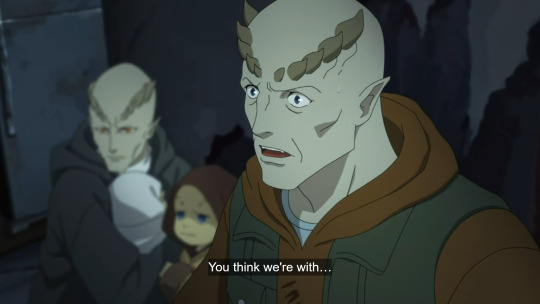
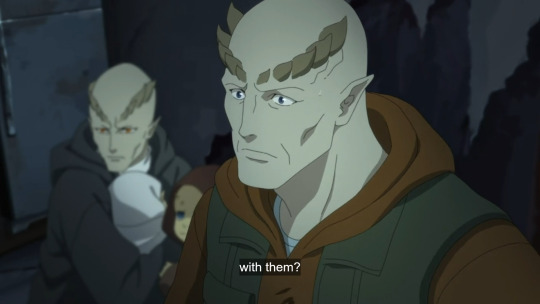
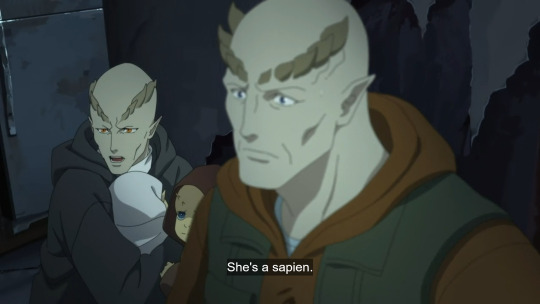
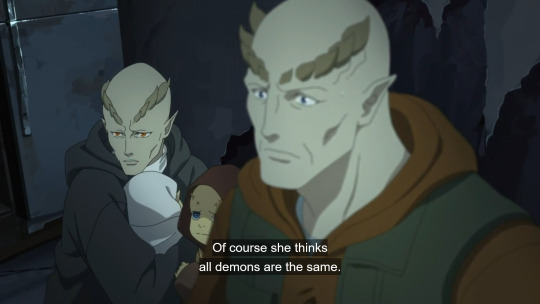
Oh shut up, you literally reveal two minutes later that you are affiliated with the White Rabbit, who was the one who allowed you to escape the war-torn Middle East Hell Makai!
I also find rich that these demons are the "good" ones. The humanoid ones. The one who look just like the "sapiens", contrasting the evil demons who look like plants and shit. Again. Do you understand what you are implying? Maybe don't use fucking demons as a political metaphor for real people?
(wait, I just realized. What does this mean for that shapeshifting demon that turns into a baby, Vergil and that other soldier guy? That minorities... disguise themselves as the oppressive majority... to hurt them...? Guys, I think the metaphor is eating itself.)
And yeah, the Christian bashing is getting old. I get it. CHURCH BAD, because AMERICA BAD. I don't know how to convey how much I am sick of these blunt messages without sounding like an American right-winger lmao, but you make a good point: Christians are not just American Karens, and the topic is more complicated than "American politicians use Christianity as a weapon, therefore Christianity bad" (I can't help but notice how convenient it is that demons attack the Vatican in the first episode, but not holy places of other religions). I wonder if fans of this show will also use the excuse fans of NFCV use and say "no no no you see God is good, it's the humans who twist His message! The show is totally nuanced guys!". I'm expecting something as stupid as NFCV's water-blessing zombie :P
I'm really sorry this show has upset you. I can only imagine how insulting it feels to see a real war you witnessed turned into a scene of America bombing Hell and scaring Arab-coded demons while American Idiot plays in the background. You deserve much better and I hope things look up in general 🫂
#anti dmc netflix#i think this really takes the cake as the most offensive parallel#more than nocturne's vampire slaveowners#because this is a core theme of the story#and it expects pat pats on the head for it
33 notes
·
View notes
Text
TW: racism
I think the way that comic book media has uncritically pushed anti-Arab racist propaganda (among other kinds) for decades upon decades is an important thing to acknowledge. Like it's not just a couple of bad apples here and there, it's always been pervasive. So many stories, so many villains, so many Arab coded fake evil countries. That kind of thing desensitizes people, dehumanizes entire groups. The politics of media designed for young men and boys (and not just them but for years that was the only audience that mattered, thanks sexism) has consequences.
Seriously, what was this:
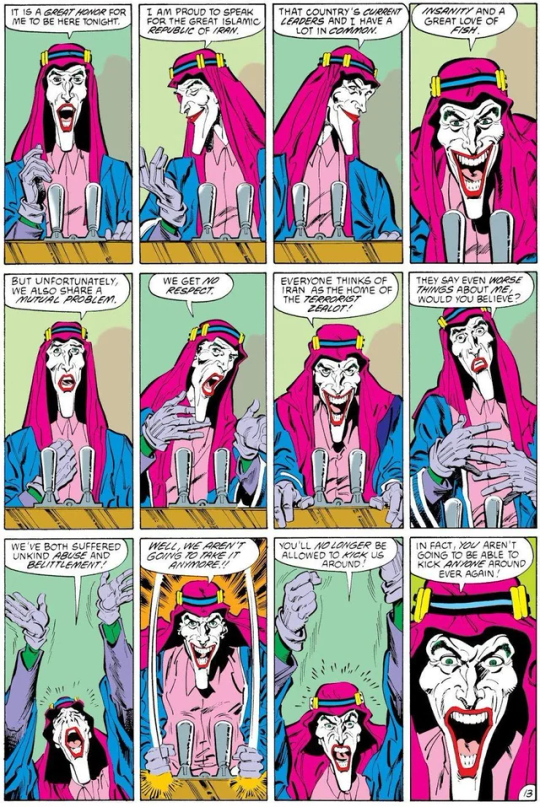
As far as I'm aware this never even got an explicit retcon.
I was a little Muslim boy in the mid 2000s reading a Death in the Family because I wanted to know what happened to Jason Todd, and I didn't understand the depths of the propaganda that was being fed to me. I was so desensitized to hearing about terrible things happening in the middle east, and evil terrorists that I didn't question it. And my parents talked to me about what was going on and how it was wrong. But I was still a little kid and I loved Batman and I wasn't at the point where I could really look at the narrative critically, to realize that the authors have worldviews that are biased. I don't think I even grasped that different people wrote the characters. Iran electing known super-terrorist-serial killer-baby eating clown The Joker to represent them because he understood their values is yes, notably crazy, but most of this stuff isn't so loud and obvious, and we didn't leave it in the 80s. Just look at what happened to the depiction of Talia and Ra's post 911 and how they progressive became less human. So just think about the generations of kids reading this crap who had no counter messaging at all. Where does that leave their empathy?
I'm not saying that everything we're seeing is the fault of comic books, that's stupid and reductive and insulting to the complexity of the reality. But what I'm saying is that a lot of these narratives are actively complicit in the kinds of inhumanity we're seeing. Marvel thinking it's appropriate to throw Sabra into a movie in current day is a glaring transgression but it's not some kind of strange outlier. Lots of those films are actively funded by arms of the American military, just look at Captain marvel and Iron Man. And if anyone likes imposing an agenda onto the narrative, it's the military. A lot of this is baked into the fiction, and we owe it to ourselves and others to actively contend with what that means.
I dunno I'm just mad, and disappointed and maybe a little guilty that it took me this long to really realize the full state of things. I spent a lot of time blindly consuming. Like these books were created to be aspirational, to show good people trying to make a better world. But as always happens when art is completely beholden to money, they still serve the politics of the ruling class at the end of the day.
#dc comics#marvel comics#marvel mcu#batman#captain america#iron man#dehumanisation tw#i/p#imperialism#tw racsim#talia al ghul#ra's al ghul#reposted with better formatting#get off of my lawn
200 notes
·
View notes
Text
Fiction Podcasts + Language Learning!
(Audiodramas recommendations whcih main language is English but they also future heavily other languages)
Korean- Moonface
A fiction show about a Korean American son (Joel Kim Booster) who wants to come out to his mom (Esther Moon), but can't because they don't speak the same language
Tagalog- Hi Nay
Hi Nay, literally translated to “Hi Mom”, is a supernatural horror fictional podcast about Filipina immigrant Mari Datuin, whose babaylan (shaman) family background accidentally gets her involved in stopping dangerous supernatural events in Toronto.
Spanish- Celestial Blood
Celestial Blood is a bilingual radionovela about love and secrets in the family of twins Sol and Mundo Lucero.
If you have any other recs (specially of hindi, nahuatl, arabic, tagalog or thai) pls comment!
#langblr#tagalog#spanish#korean#language learning#korean langblr#tagalog langblr#spanish langblr#fiction podcast#podcast recommendations#audio drama#audiodrama sunday
648 notes
·
View notes
Text
There’s a chapter of the Qur’an called “Comfort,” sometimes translated as “Consolation” or “Solace.” And in it, a verse: “With every hardship there is ease. With every hardship there is ease.” The same line repeated twice, in case we have trouble believing it the first time. In case we have a hard time recognizing ease even when it is offered to us, even when it is served to us on a white plate. In case we are drowning in our hardship and cannot see those tiny life rafts of ease—soft potatoes, meat slow-roasted to velvet, your mother’s laugh trilling gently in your ear. -Aisha Abdel Gawad, BETWEEN TWO MOONS
#fiction#debut ficion#between two moons#aisha abdel gawad#quran#coming of age fiction#arab american stories
49 notes
·
View notes
Text
🇵🇸 Palestinian Fiction Books for Your TBR 🇵🇸
✨ Fiction stories can make an individual's experience universal and easier to understand from an outsider's perspective. We learn about one another's histories, realities, and cultures through fiction stories, even if we don't realize it. As a way of educating yourself and empathizing, here are a few Palestinian fiction books you can add to your ever-growing TBR for read Palestine Week.
🇵🇸 Please, please help me ensure these books receive the attention they deserve by sharing this post.
🌙 Minor Detail by Adania Shibli 🇵🇸 Salt Houses by Hala Alyan ✨ A Woman is No Man by Etaf Rum 🌙 Against the Loveless World by Susan Abulhawa 🇵🇸 The Sea Cloak: And Other Stories by Nayrouz Qarmout ✨ Wild Thorns by Sahar Khalifeh 🌙 The Parisian by Isabella Hammad 🇵🇸 Palestine +100: Stories from a Century after the Nakba ✨ Mornings in Jenin by Susan Abulhawa 🌙 We are All Equally Far from Love by Adania Shibli 🇵🇸 My First and Only Love by Sahar Khalifeh ✨ Where the Bird Disappeared by Ghassan Zaqtan 🌙 Trees for the Absentees by Ahlam Bsharat 🇵🇸 Mother of Strangers by Suad Amiry ✨ You Exist Too Much by Zaina Arafat
#read palestine week#save palestine#free palestine#books#book list#muslim writers#arab american writers#arab american heritage month#fiction books#batty about books#battyaboutbooks#book blog#booklr#bookstagram#books to read
44 notes
·
View notes
Text
introduction
hello to my one follower (you know who you are ;) LMAO).. this is just a quick little get to know me about who i am and what my account will be for!
what's your name? i'm rani! (pronounced raw-nee) it's not my government name (which i will not be disclosing for privacy) but rani is a loving nickname i do have :)
where are you from? i'm american, ethnically pakistani from punjab.
how old are you? i'm 18!
what's your personality type? infj-t (i have the rarest personality type which is insane to me)
what are your hobbies? watching formula one (forza ferrari!), listening to music, reading, writing, and cooking! i also love anything motorcycles and cars.
what is your favorite animal? cats but i'm allergic 💀
what is your favorite food? chicken alfredo.
do you have any favorite artists? yes! i honestly love a little bit of everything. i love country music including morgan wallen and riley green (they can get it), zayn (he can also get it), tyla, sabrina carpenter, lana del rey, the neighbourhood, bayou, and punjabi music too (karan aujla, sukha, ezu, and more!)
what is your favorite color? either a garnet red or a blush pink
what month were you born in? january
what is your sign? an aquarius
what languages can you speak? english, punjabi, urdu, and arabic.
okay now about this account... i made it out of impulse because of my love for writing and my best friend asking me to make an account on tumblr. i have an unhealthy obsession with older men and simon ghost riley from cod so i will be writing a lot of blurbs about fictional men and just random stuff HAHA. i will always be sure to tag my writing for any content warnings like mature content or potential trigger warnings.
requests are OPEN. it’s up to me though if i want to write something if it is requested, so please don’t take it personally if i simply decide to not write a request you wrote in!
note: all of my works will be x female!reader.
i know this was a lot to read so thank you so much for reading all of this. if yall have any more questions or requests (cough cough my one follower) please feel free to ask!
~ yours truly, rani ♥︎
20 notes
·
View notes
Text
Queer Fiction Free-for-All Book Bracket Tournament: Round 2B


Book summaries below:
Iron Widow by Xiran Jay Zhao
The boys of Huaxia dream of pairing up with girls to pilot Chrysalises, giant transforming robots that can battle the mecha aliens that lurk beyond the Great Wall. It doesn't matter that the girls often die from the mental strain.
When 18-year-old Zetian offers herself up as a concubine-pilot, it's to assassinate the ace male pilot responsible for her sister's death. But she gets her vengeance in a way nobody expected—she kills him through the psychic link between pilots and emerges from the cockpit unscathed. She is labeled an Iron Widow, a much-feared and much-silenced kind of female pilot who can sacrifice boys to power up Chrysalises instead.
To tame her unnerving yet invaluable mental strength, she is paired up with Li Shimin, the strongest and most controversial male pilot in Huaxia. But now that Zetian has had a taste of power, she will not cower so easily. She will miss no opportunity to leverage their combined might and infamy to survive attempt after attempt on her life, until she can figure out exactly why the pilot system works in its misogynist way—and stop more girls from being sacrificed.
Science fiction, fantasy, science fantasy, retelling, series, young adult
The Thirty Names of Night by Zeyn Joukhadar
Five years after a suspicious fire killed his ornithologist mother, a closeted Syrian American trans boy sheds his birth name and searches for a new one. He has been unable to paint since his mother’s ghost has begun to visit him each evening. As his grandmother’s sole caretaker, he spends his days cooped up in their apartment, avoiding his neighborhood masjid, his estranged sister, and even his best friend (who also happens to be his longtime crush). The only time he feels truly free is when he slips out at night to paint murals on buildings in the once-thriving Manhattan neighborhood known as Little Syria.
One night, he enters the abandoned community house and finds the tattered journal of a Syrian American artist named Laila Z, who dedicated her career to painting the birds of North America. She famously and mysteriously disappeared more than sixty years before, but her journal contains proof that both his mother and Laila Z encountered the same rare bird before their deaths. In fact, Laila Z’s past is intimately tied to his mother’s—and his grandmother’s—in ways he never could have expected. Even more surprising, Laila Z’s story reveals the histories of queer and transgender people within his own community that he never knew. Realizing that he isn’t and has never been alone, he has the courage to officially claim a new name: Nadir, an Arabic name meaning rare.
As unprecedented numbers of birds are mysteriously drawn to the New York City skies, Nadir enlists the help of his family and friends to unravel what happened to Laila Z and the rare bird his mother died trying to save. Following his mother’s ghost, he uncovers the silences kept in the name of survival by his own community, his own family, and within himself, and discovers the family that was there all along.
Featuring Zeyn Joukhadar’s signature storytelling, The Thirty Names of Night is a timely exploration of how we all search for and ultimately embrace who we are.
Literary fiction, magical realism, contemporary, historical fiction, 1930s, lyrical, adult
#polls#queer fiction free for all#iron widow#xiran jay zhao#heavenly tyrant#the thirty names of night#zeyn joukhadar#books#fiction#booklr#lgbtqia#tumblr polls#bookblr#book#lgbt books#queer books#poll#fiction books#book polls#queer lit#queer literature
30 notes
·
View notes
Note
Kash Patel should release the files on Trump. His Tax Returns, how much money he's made off of the taxpayers while golfing at his resorts, how much tax payers paid for the stays of his guests at his Hotel and Resorts, and his bone spurs claim because Veterans who served in Viet Nam need to know that!
You're right ... and he should also release Obozo's weekly expenses, golf trips, 4 vacations per year for Mike and the girls, her "staff" of 25 (who did nothing), weekly BBQ take-outs, Wednesday cook-outs with his homeys, the distribution of his "Infrastructure and Shovel Ready" give-away from his first month in office, how much money and technical info he gave to Iran and exactly what he did his first month in office to deserve a Nobel Prize, besides starting 3 wars, the Arab Spring and funding of ISIS ... oh ... and release the real truth about his Benghazi fiasco that cost the lives of 4 Americans ... Obozo's tax returns would make a great "Creative Writing" class for fictionalization of an 8 year farce ...
... and finally ... release John Kerry's Military Medical Records so that all Vietnam veterans can so how he "earned" his 3 Purple Boo-Boos ...
30 notes
·
View notes
Text
Feminist Non-Fiction Recs
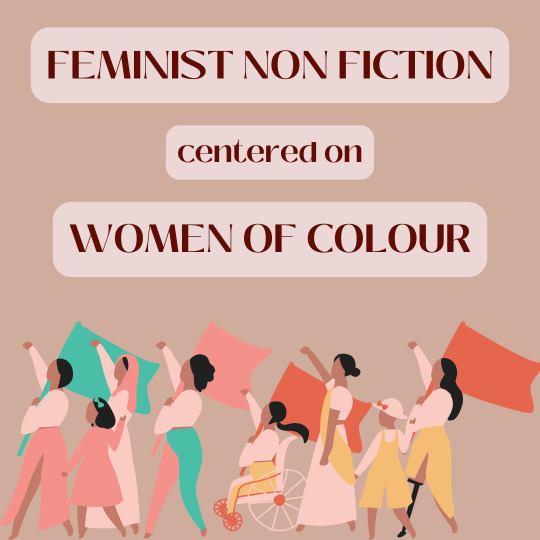
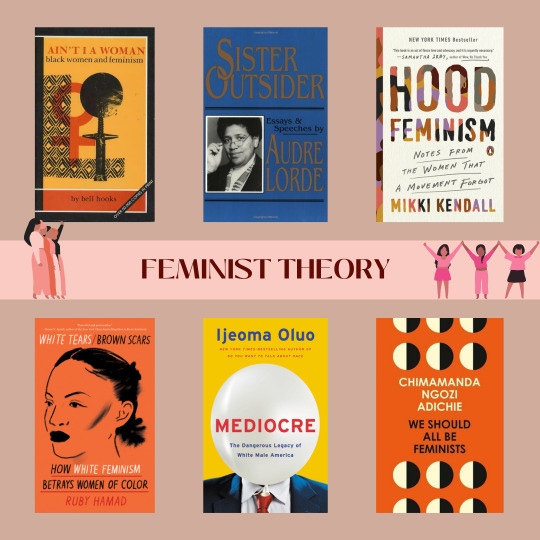


Because feminism isn't only about your own voice and your own rights, but about the liberation of all women, it's important to uplift the voices of women who are rarely heard. To honour this international day of Women's Rights, here are some recommendations for non-fiction feminist theory books centered on women of colour.
Please note that this is a non-exhaustive list, and that some very important works might not figure on it. Take it as inspiration, not as a binding list of works to have read, and remember that this is only the surface of women of colour's writings on feminism.
all of bell hooks' books, but I would recommend "Ain't I a Woman: Black Women and Feminism" to start with intersectional feminism
There Is No Hierarchy of Oppression; by Audre Lorde
Sister Outsider; by Audre Lorde (all of Audre Lorde, actually)
Hood Feminism; by Mikki Kendall
White Tears, Brown Scars; by Ruby Hamad
Mediocre; Ijeoma Oluo
We Should All Be Feminists; by Chimamanda Ngozi Adichie
This Bridge Called My Back; an anthology edited by Cherríe Moraga and Gloria E. Anzaldúa
Bad Feminist; by Roxane Gay
I Am Malala; by Malala Yousafzai
Black Feminist Thought: Knowledge, Consciousness, and the Politics of Empowerment; by Patricia Hill Collins
Arab & Arab American Feminisms: Gender, Violence, & Belonging; an anthology edited by Rabab Abduhaldi, Evelyn Alsultany and Nadine Naber
Making Space for Indigenous Feminism; an anthology edited by Joyce Green
Beyond Veiled Clichés: The Real Lives of Arab Women; by Amal Awad
The Trouble with White Women: A Counterhistory of Feminism; by Kyla Schuller
A Decolonial Feminism; Françoise Vergès
Eloquent Rage: A Black Feminist Discovers Her Superpower; by Brittney Cooper
Women, Race, & Class; by Angela Y. Davis
These books really only scrape the surface of an intersectional approach of feminism focused on race, and if you want to discover more works, I would recommend looking at intersectional feminism and decolonial feminism. Also, if you're not a native English speaker or if you speak fluently multiple languages, I recommend looking for feminist books originally written in other languages that may not have been translated to English, as they offer a perspective that is not so American-centered, which I feel is the case in too much of today's feminism.
#international women's day#feminist books#feminist theory#intersectional feminism#decolonial feminism#women of color#non fiction books#book recs#book recommendations
119 notes
·
View notes